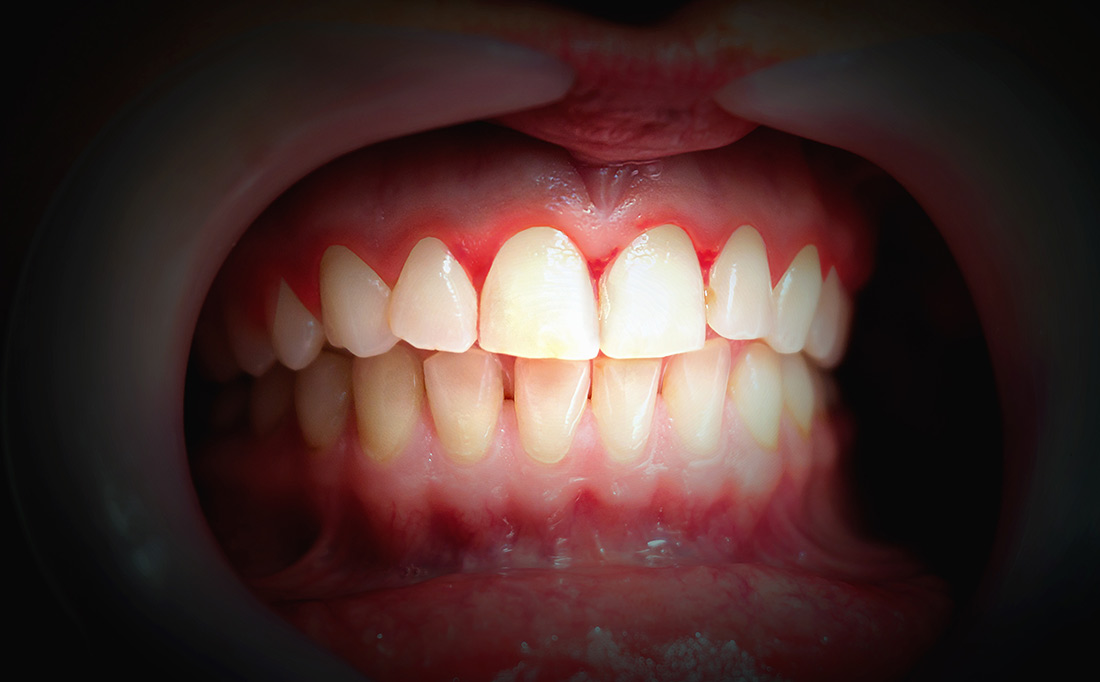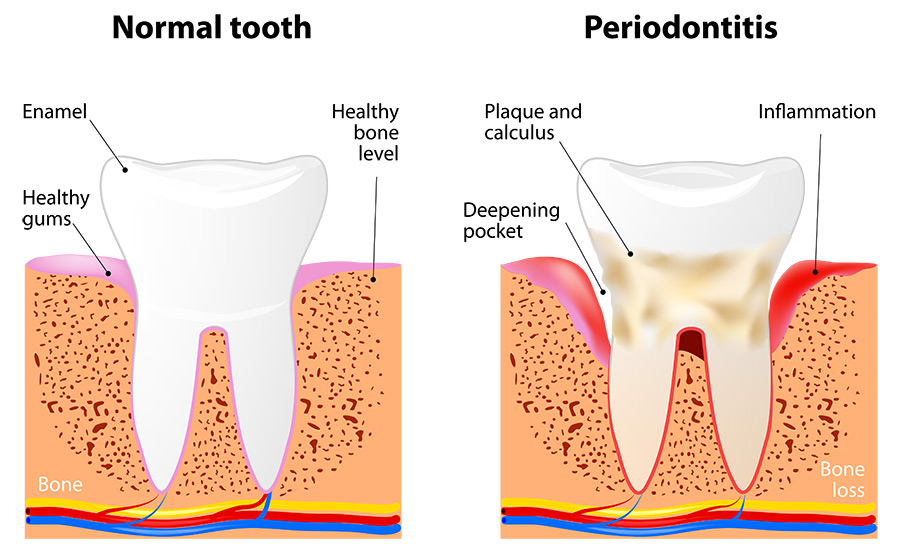
Do your gums bleed after brushing or flossing? Chances are you might have gum disease!
Bleeding Gums & Gum Disease
Bleeding gums are extremely common. Many people find that their gums bleed, sometimes a little, sometimes a lot, after they brush or floss. Bleeding gums are so common that many people don’t think anything of it. For many, bleeding gums is no big deal. From a professional standpoint, however, bleeding gums are a sign that something is wrong. If you see blood in the water after brushing or flossing, don’t ignore it, get it checked out as soon as possible. It could be a sign of underlying periodontal disease in your mouth.
"Periodontal disease is progressive, which means if it is not controlled, contained, and eliminated, the disease will eventually spread throughout your gums and even beyond."
DR. KAMRAN HAGHIGHAT, B.D.S., M.S., P.C.
Diplomate, American Board of Periodontology
Diplomate, American Board of Oral Implantology
What Are The Signs of Gum Disease?
Bleeding gums are one signs that you might have gum disease. However, it is not the only indication that your gums need help. Gum disease is usually characterized by inflammation, which is triggered by excessive plaque formation. When plaque and bacteria build up along the gum line, they can gradually erode your outer gum tissues resulting in ulceration and bleeding. Inflammation is your body’s natural reaction to such irritants.
Signs of gum disease include:
Bleeding gums
Receding gums
Bad breath
Redness
Swelling
Pain
Sensitivity
Shifting teeth
Loose teeth
Tooth loss
Over time, as plaque and other irritants damage the gum lining, the gums can begin to detach from the underlying periodontium and recede. This is known as clinical attachment loss. If left untreated, gum recession as a result of periodontal disease will lead to tooth loss. As the gums recede, dental roots will eventually become exposed to the elements as well as vulnerable to attack from oral bacteria. Infection at the dental roots not only destroys soft tissues but can also attack hard bone tissues. Once enough of the underlying periodontium has been destroyed and periodontal ligaments severed, tooth loss is simply unavoidable.
What Are The Consequences of Untreated Gum Disease?
Periodontal disease is a severe problem that should never be left unaddressed. Periodontal disease is progressive, which means that if it is not controlled, contained, and eliminated, the disease will eventually spread throughout your gums and even beyond.
Research has linked some of the bacteria species responsible for periodontal disease to heart conditions, such as endocarditis, to immune conditions such as rheumatoid arthritis. Recent research has even connected a keystone species of bacteria, p. gingivalis, associated with periodontal disease with Alzheimer’s Disease. The fact is, what happens in your mouth matters. Infections of gum tissues, which are loaded with capillaries and blood vessels, have a very real possibility of spreading elsewhere.
As you can see, the consequences of untreated periodontal disease can be both far-reaching as severe. Bleeding gums is only the tip of the periodontal iceberg.

I Have Bleeding Gums --- Now What?
The first step to deal with bleeding gums, and the possibility of gum disease, is to improve your dental hygiene regimen, diet, and lifestyle choices. The underlying cause of gum disease is an excessive buildup of plaque and bacteria along the gum line, causing irritation and inflammation. To combat gum disease, it is crucial to control the amount of bacteria on your gums and teeth.

Control plaque on your gums and teeth by:
Brushing twice per day with a fluoridated toothpaste and an extra soft toothbrush.
Floss at least once per day, even if your gums bleed.
Use antimicrobial mouthwashes and rinses to help control oral bacteria.
Consume less sugar to starve bacteria of resources and food.
Abstain from alcohol and tobacco which irritate and dry out your gums.
Get your teeth professionally cleaned at least once per year.
Invest In An Oral Hygiene Regimen
The most obvious strategy for controlling plaque is to invest time and money in an oral hygiene regimen. You’ll not only want to brush and floss every day, but you’ll also want to make sure to do so correctly hitting every surface and nook and cranny in your mouth. That’s why flossing is so important.
Flossing allows you to clean in between your teeth and below your gum line and mechanically remove plaque that a toothbrush can't reach. This is crucial. Even if there is blood when you floss, that doesn’t mean you should stop. Instead, assuming you are flossing gently and with the correct technique, bleeding gums should be a sign to redouble your flossing efforts.
Another easy way to help combat plaque is to purchase mouthwash. However, you should never make the mistake of relying on mouthwash alone. Instead, it is purely supplementary to brushing and flossing.
Notice that only brushing and not flossing is insufficient for good gum health. It would be best if you did both.

Best Portland Periodontist
Finally, you should get a professional dental checkup and cleaning at least once per year. If you know you have a higher risk of developing periodontal disease, get a checkup and cleaning two maybe three times a year.
High-risk groups include those with a family history of gum disease, those with chronic medical conditions such as diabetes, and those who smoke or drink alcohol. These groups should make it a point to see a dentist or periodontist much more often. Some recommend getting a gum checkup at least every six months or more.
Scheduling an appointment with a dentist or a periodontist should be the next thing you do if you have bleeding gums. Bleeding gums is an indicator that your gums are already in a state of damage and decay. Blood in the water means that the gum lining has been penetrated. While the exact location of the gingival breach can be difficult to pinpoint, it is there, and certain strains of oral bacteria will exploit it. Even if you think you know the source of the blood, it is best to get a professional to look at it. There may be other trouble spots in your mouth that are not highly visible, or you may not be aware of any problems.




Are You Diagnosed with Gum Disease?
If you do see a gum expert (periodontist), and they diagnose you with gum disease, good oral hygiene may not be enough depending on the scope and severity of the infection.
Mild gingivitis can be controlled with proper oral hygiene. However, more advanced stages of periodontal diseases, such as periodontitis, will require extensive professional treatment. Professional treatment is crucial in cases of severe periodontitis. At an advanced stage, the gums cannot repair themselves. If it is not aggressively treated, advanced periodontal disease will spread and progress, eventually leading to gum recession and tooth loss. That’s because damage to gums is permanent.
Once gums have suffered a certain degree of clinical detachment, they will form gum pockets that trap even more debris and bacteria. The gum pockets lead to further gingival delamination and detachment, causing a vicious cycle of gum destruction. These pockets must be professionally cleaned and maintained via special “deep cleanings” designed to eliminate bacteria and remove trapped food and debris. Gum pocket surgery may be necessary to reduce the size and occurrence of gum pockets. In areas where gum recession as a result of pocketing has led to exposed dental roots, it may be necessary to undergo a gum graft procedure to replace lost gum tissues.
As you can see, gum disease can be a real pain. That’s why dealing with bleeding gums promptly and with professional assistance is so important. While the best solution is prevention, through rigorous oral hygiene and regular visits to a dental clinic, we recognize that this isn’t always possible. Sometimes we let our guard down or get complacent. However, bleeding gums should be a wakeup call to take action and see your periodontist. The health of your gums, mouth, and body are at stake.









[…] is common knowledge that periodontal disease, also known as periodontitis or severe gum disease, is an infection and inflammation in the mouth, specifically the gums, which when left untreated […]